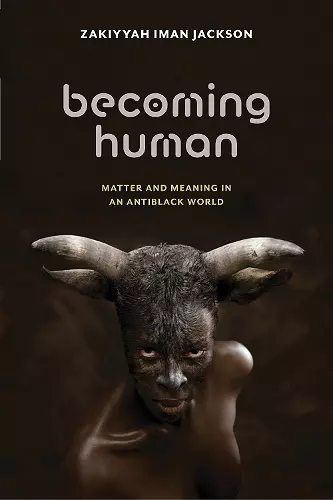Becoming Human
Matter and Meaning in an Antiblack World
Format:Hardback
Publisher:New York University Press
Published:19th May '20
Should be back in stock very soon

Winner, 2021 Gloria E. Anzaldúa Book Prize, given by the National Women's Studies Association
Winner, 2021 Harry Levin Prize, given by the American Comparative Literature Association
Winner, 2021 Lambda Literary Award in LGBTQ Studies
Argues that Blackness disrupts our essential ideas of race, gender, and, ultimately, the human
Rewriting the pernicious, enduring relationship between Blackness and animality in the history of Western science and philosophy, Becoming Human: Matter and Meaning in an Antiblack World breaks open the rancorous debate between Black critical theory and posthumanism. Through the cultural terrain of literature by Toni Morrison, Nalo Hopkinson, Audre Lorde, and Octavia Butler, the art of Wangechi Mutu and Ezrom Legae, and the oratory of Frederick Douglass, Zakiyyah Iman Jackson both critiques and displaces the racial logic that has dominated scientific thought since the Enlightenment. In so doing, Becoming Human demonstrates that the history of racialized gender and maternity, specifically anti-Blackness, is indispensable to future thought on matter, materiality, animality, and posthumanism.
Jackson argues that African diasporic cultural production alters the meaning of being human and engages in imaginative practices of world-building against a history of the bestialization and thingification of Blackness—the process of imagining the Black person as an empty vessel, a non-being, an ontological zero—and the violent imposition of colonial myths of racial hierarchy. She creatively responds to the animalization of Blackness by generating alternative frameworks of thought and relationality that not only disrupt the racialization of the human/animal distinction found in Western science and philosophy but also challenge the epistemic and material terms under which the specter of animal life acquires its authority. What emerges is a radically unruly sense of a being, knowing, feeling existence: one that necessarily ruptures the foundations of "the human."
"This is a demanding, complex, and highly significant contribution to the literature on the nature of the moral and philosophical distinctions between human and nonhuman creatures...The implications for theological anthropology are, undoubtedly, shattering." * Literature and Theology *
"Within Western philosophy, Zakiyyah Iman Jackson shows, Black people historically have been 'animalized.' In examining these limitations of Western philosophy, Becoming Human shows that the fundamental idea of 'humanity' that has gained widespread credence in the West is flawed … Jackson makes an intervention by firmly placing Black literary and visual culture into philosophy." * Public Books *
"Jackson’s scholarship has been critical to my recent curatorial work. This groundbreaking book considers how Blackness can coincide with notions of the nonhuman and animality through imaginative and emancipatory modes of being, invoking a future that breaches contemporary ideas of humanism through thoughtful research and cultural references that center Black women as a site of origin." * Artforum, "Best of 2021" *
"Rewriting the pernicious, enduring relationship between Blackness and animality in the history of Western science and philosophy, Becoming Human: Matter and Meaning in an Antiblack World breaks open the rancorous debate between Black critical theory and posthumanism [...] What emerges is a radically unruly sense of a being, knowing, feeling existence: one that necessarily ruptures the foundations of 'the human." * Black Perspectives *
"Jackson states that real change will require “revolutionizing” the human body, and her prescription for freeing oneself from the limitations of gender and species requires the same “plasticity" by which Blackness and anti-Blackness continue to be defined." * CHOICE *
"The book presents a compelling argument and offers worthwhile suggestions. I will certainly have my undergraduates wrestle with some of this material in upcoming semesters." * Religions Journal *
"The sheer beauty, force, and ingenuity of Zakiyyah Iman Jackson's aesthetic strategies and gestures are on display as she performs the very risks and rewards she conjures. Offering a brilliant intervention into questions of the human, each of Jackson’s readings profoundly unsettle our presumed relations and prevailing ontologies. She reads western philosophy and science through African diasporic literatures, theories, and visual art to open us up to what is made—what might be made—in excess of the matrix of antiblackness and its constitutive forms of the human, animal, gender, and matter. In the book’s range of knowledges, reach, and scope, no field nor discipline would not benefit from a real and sustained engagement with the work that Jackson undertakes here." -- Christina Sharpe, author of In the Wake
"Brilliantly reframes the relation between blackened life and the category of the human, by shifting the terms of the debate. She maintains that neither dehumanization nor exclusion are sufficient to explain antiblackness and its descending scale of life. In so doing, Jackson's ‘ontological plasticity’ reveals the controlled depletion that produces the liquidity of life and fleshly existence, and enables blackened life to be anything, which is also to say nothing at all. Jackson’s rigorous and sustained meditation is relentless in exploring the possibilities for a generative disordering of being, inhabiting other senses of the world, and imagining the field of relation in ceaseless flux and directionless becoming." -- Saidiya Hartman, author of Wayward Lives, Beautiful Experiments
ISBN: 9781479890040
Dimensions: unknown
Weight: 581g
320 pages